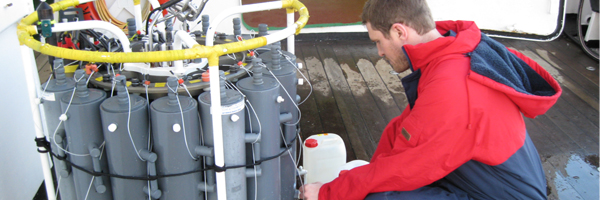SciLifeLab chosen for large EU-project to improve Baltic Sea health
[PRESS RELEASE 2013-12-16] In November, the first seven projects in the EU research program BONUS for viable ecosystems in the Baltic Sea were selected. One of them is BLUEPRINT, which aims at developing a genetic tool for environmental monitoring of the sea. All the DNA sequencing performed in the project will be carried out at SciLifeLab.
Anders Andersson at SciLifeLab and his colleagues in the BLUEPRINT project are developing a new method for monitoring the health status of the Baltic Sea. The plan is to analyze the genes and gene-transcripts of microorganisms in the sea to determine what metabolic processes are active and from this get information on the environmental status.
“Microbes are the main drivers of most nutrient cycles in the sea, which means that the expressed gene-pool of a sample reflects local nutrient fluxes”, says Anders Andersson, assistant professor at KTH and SciLifeLab. “Microbes also respond quickly to environmental changes so they are ideal for environmental monitoring. Despite this, with the exception of filamentous cyanobacteria, microbes have largely been overlooked in monitoring programs”.
BLUEPRINT comprises five partner countries and combines field studies, experimental studies like gene sequencing, bioinformatics and modeling. Recently the project was granted support from the large research BONUS program, which is funded by the national research institutions in the Baltic Sea states and the 7th Framework Program of the EU. Until the end of 2017, BLUEPRINT will receive a total of EUR 4 million in funding from the BONUS project. All gene sequencing that is done within the project will be performed at SciLifeLab and Anders Andersson’s group will be responsible for the bioinformatics within the project.
“Thanks to the new high-throughput sequencing technologies we have at SciLifeLab, we now have capacity for retrieving detailed genetic information from hundreds of environmentally well-characterised samples”, says Anders Andersson. “This way we can link local environmental conditions to microbial gene- and transcript profiles and in the future quickly determine the environmental status of samples of unknown character”.
The project also aimes at improving the biogeochemical models of the Baltic Sea ecosystem. By having more information on what processes are active in the different parts of the Baltic Sea, such models can likely be refined, leading to better predictions and in the long run better ecosystem management. The project will also uncover the genomes of many Baltic Sea bacterioplankton. In a recent study Anders Anderssons group showed that a population of Spartobacteria, which is abundant in the Baltic Sea, encodes a battery of enzymes for metabolizing complex carbohydrates, which is a quite rare feature for marine organisms.
“The abundance of Spartobacteria correlates with some specific Cyanobacteria so most likely these produce what Spartobacteria eat. We now aim to reconstruct the genomes of a number of dominant bacterioplankton species in the Baltic to learn about their ecosystem functions”, says Anders Andersson.
About BONUS
BONUS is a joint research and development program involving all Baltic Sea states as well as the Netherlands and Russia. It aims to ensure cleaner, sustainable and a more prosperous Baltic Sea. The EUR 100 million program is funded by the national research institutions in the Baltic Sea states and the 7th Framework Program of the EU. The selected BONUS projects comprise a total of 67 participating organizations.
In this first round of funding seven projects were supported. Among them is the BLUEPRINT project, which includes partners from Sweden (KTH Royal Institute of Technology, Stockholm University and Linnaeus University), Denmark, Estonia, Finland and Germany. In total the projects will get EUR 27 million until the end of 2017. BLUEPRINT will get EUR 4 million during this period.
Read more at bonusortal.org
For further information, please contact:
Anders Andersson
e-mail: anders.andersson@localhost
phone: +46 (0) 8 524 814 14





